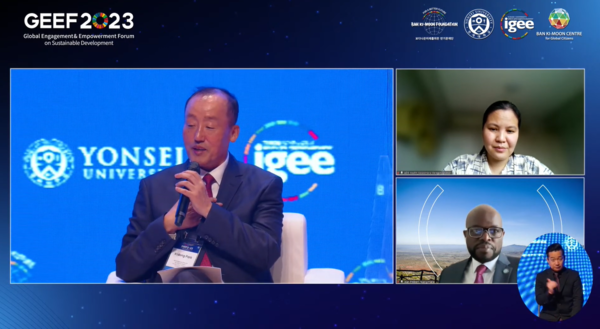Leaders of global and regional health organizations said that digital health needs to be prioritized to develop new interventions to improve public health equity at the Global Engagement and Empowerment Forum (GEEF) 2023 held in Yonsei University, Seoul, on Thursday.

The session first outlined the status of digital health technologies through guidance documents presented by the World Health Organisation (WHO), Asia Development Bank (ADB) and African CDC representatives.
Then, a panel discussion with government and private sector officials followed, under the theme of the GEEF 2023 “Turning Crisis into Opportunity.”
Dr. Park Ki Dong, Director of Data, Strategy and Innovation of the WHO Western Pacific Office presented on WHO/WPRO’s digital health strategy and said that digital health plays a critical role in turning crisis into opportunity.
He said, “Digital health does not exist in a vacuum, it has enormous potential but can also increase inequalities by disproportionately benefiting those who start at a disadvantage due to economic status, education, living environment, age and more.”
He referenced the WHO’s global strategy on public health and the UN’s roadmap for digital cooperation, alongside WHO’s regional action agenda which was developed bearing in mind that countries all have different digital development and thus provides suggestions based on the country’s ICT Development Indexes (IDI).
The development indexes are divided into four tiers-- initial stage, development stage, advanced stage, and countries with small populations.
Park stressed that countries need to first assess their health development status, which will then guide them to identify priority areas for strengthening essential digital health foundations. With this prioritised investment, countries' health systems can provide quality services accessible to all populations even vulnerable communities at an affordable cost to advance sustainable development goals (SDG) and universal health coverage (UHC), he said.
Similarly, Chief Digital Advisor to the African CDC, Jean-Philbert Nsengimana, presented its digital transformation strategies which focus on six strategic objectives highlighting a project called the “Emerging Flagship Initiatives.”
The project includes setting up a digital innovation sandbox to accelerate innovation and also benchmark progress annually through an African digital health index.
He said, “Despite having health care spending of $84 annually per capita compared to $3476 and $10,921 in the EU and U.S. respectively and having just 1 doctor for every 50,000 people compared to 1 for every 250 and 400 in the EU and the U.S., leveraging digital technologies is the only way to overcome these limitations to achieve UHC.
Meanwhile, the Asia Development Bank (ADB) representative also presented its guidance documents and outlined some projects where they are providing support to regional organizations like the Asia eHealth Information Network (AeHIN) for developing a standards and interoperability lab and government institutions like India, Lao, and Nepal.
Later, in the panel discussion, the Honourable Minister of Health of Vanuatu, Rick Mahe, said that small island states like Vanuatu especially need digital health interventions as the country is comprised of 82 islands.
While he expressed that his country is prioritizing decentralizing health, he mentioned that they still require technical input to design and input plans for digital health.

Sharing from an industry perspective, Naver’s Director of Digital Health Rha Koon-ho said, “Based on our expertise in cloud technology and AI platforms, Naver can be used as an infrastructure for healthcare companies.”
“Recently, a lot of interest has risen in ChatGPT, a GPT-3.5 based chat engine, and we believe that AI-based platforms like this go hand in hand with healthcare,” he added.
He explained that it can solve inequality healthcare issues which do not only affect developing countries but also developed countries like Korea.
Rha elaborated on the limits to employ more social health care workers and build more hospitals and offered an example of how his company is currently employing AI technologies to support healthcare, “Right now, we are using AI technologies to make social welfare calls to 7000 senior citizen single-member households in South Korea to check in on them daily.”

